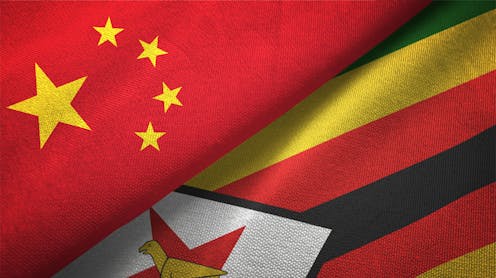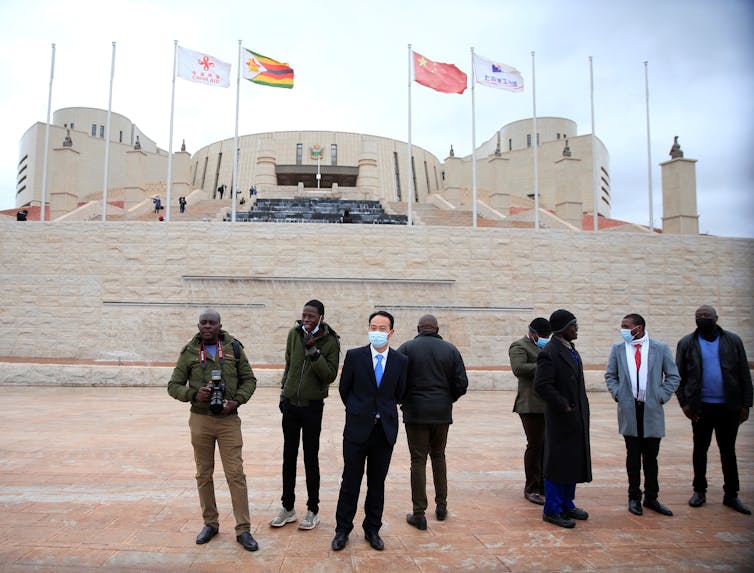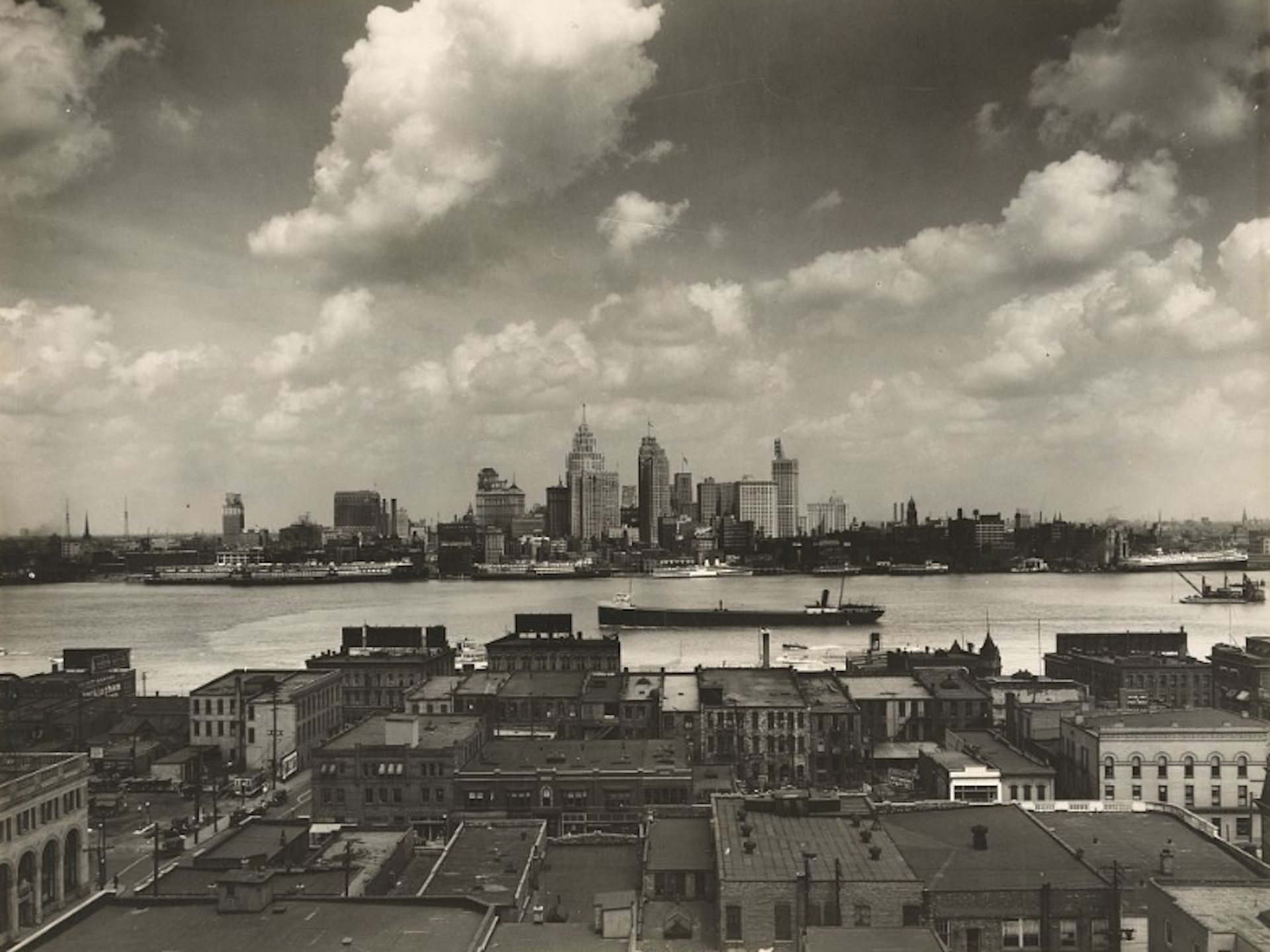We asked 1,000 Zimbabweans what they think of China's influence on their country − only 37% viewed i
Politicians and scholars debate whether China’s economic investments in Africa benefit or exploit local populations. But what does the public think?

China has big ambitions in Africa. Between 2000 and 2020, the economic superpower loaned African governments US$159 billion to build railroads, highways, stadiums and bridges.
Complementing those loans, foreign direct investment by Chinese-owned businesses that operate in Africa and employ Africans have grown from $75 million in 2003 to $5 billion in 2021.
China’s investment and influence in the region has garnered both recognition and criticism from scholars as well as Western media. Some see a mutually beneficial relationship that improves infrastructure and economic development for African countries. Others warn that China’s presence and noninterference policy is a guise for its intent to “colonize” Africa.
As professors of political science who study Africa-China relations, we’ve seen how the arguments on either side rarely factor in how the African public feels about China’s involvement on the continent. So in March 2023 we asked 1,000 urban professionals in Zimbabwe – 64% were college educated; 94% lived in urban areas – for their opinions on China’s economic and political influence on their country. Our study is currently under journal review.
We found that exposure to Western media led to a more negative view of China’s economic and political activities in Zimbabwe. Exposure to Chinese media, such as the English-language People’s Daily and Xinhua News, meanwhile, improved Zimbabweans’ views of China’s economic activities – but had little or no effect on their views of China’s political activities.
Our study also shows that the political party that respondents belonged to played a role in how much they were influenced by Chinese or Western media.
China’s long relationship with Zimbabwe
During the Cold War, China competed with the Soviet Union to project itself as a force for liberation in Africa.
For example, China trained and supported the Zimbabwe African National Union - Patriotic Front, or ZANU-PF, which was fighting for the liberation of the Black majority from the white-minority government led by white supremacist Ian Smith. The ZANU-PF has remained in power in Zimbabwe since the country’s independence from the U.K. in 1980.
This relationship has been unshakable since 2003 when then-President Robert Mugabe’s government was sanctioned by the West. The sanctions followed a controversial land reform policy that led to white Zimbabwean farmers losing land to Black Zimbabweans. China responded by strengthening its economic ties with Zimbabwe – providing loans and increasing investments.

Debt-trap diplomacy?
However, the specter of colonization still haunts Africans, and some politicians and scholars depict China as a colonizing power dressed in a mantle of noninterference. They accuse China of exploiting African countries to enrich itself.
These critics claim that loans from China trap African countries in debt as China makes further inroads into Africa’s economic landscape. This is a precursor for neocolonization, some observers claim.
Furthering this argument is the fact that Chinese companies have contributed to the destruction of areas of Zimbabwe, Sudan, Democratic Republic of Congo and Ghana through mineral and oil extraction – disrupting natural landscapes, emitting hazardous pollutants and displacing local residents.
On the other hand, proponents of greater Africa-China relations see the economic ties as mutually beneficial. They say the debt-trap narrative underestimates the decision-making capacity of African governments who seek to leverage the economic advantages from their relationship with China to benefit their populations.
This vantage point posits that China boosts economic development, that Chinese loans are not significant drivers of debt distress, and that there is an overemphasis on the drawbacks of China’s investment in Africa.
African perspectives on China
As to what ordinary Africans think about Chinese influence, survey data collected by the independent research network Afrobarometer in more than 30 countries between 2019 and 2021 shows that roughly 63% of Africans think China’s economic and political influence is positive.
This public perception of China is on par with public perception of the United States – which 60% of Africans view favorably when it comes to economic and political influence.
Our survey respondents in Zimbabwe, however, were far more critical: Only 37% viewed China’s influence positively.
We also examined how foreign media coverage from the West – specifically the U.S. and U.K. – and from China influenced respondents’ views on China’s economic and political influence.
While Chinese media is favorable to China’s involvement in Zimbabwe and emphasizes how Zimbabwe benefits from the relationship, Western media is critical of China’s economic presence and warns about exploitation.
We found that Zimbabweans were more likely to negatively perceive China’s economic and political impact when exposed to critical coverage. Researchers call this a negativity bias. We found the effect of positive media coverage was more limited – and affected the perceptions of Chinese economic influence but not political influence.
However, partisanship also played a role in how likely Zimbabweans were to be swayed by foreign media. Zimbabweans who support the country’s China-friendly incumbent party ZANU-PF were more likely to be influenced by foreign media than opposition supporters. Their favorable views of China diminished when exposed to critical news and improved when exposed to favorable news.
Opposition party supporters, meanwhile, already had a critical position toward China and were less likely to be swayed by media. This echoes the opposition party’s critical stance on China. Concerning China’s political influence, we found neither positive nor negative media coverage significantly affected their attitudes.
Weight of public opinion
What ordinary Africans think of China has significant implications for China, especially in democracies and in countries where the opposition parties have influence. China, of course, knows this and uses its news media to sway public opinion in Africa.
We believe the discussion surrounding China’s presence in Africa should be democratized by taking public opinion more seriously. Although China might win the hearts of African elites through economic investments, critical voices exist among the public, especially among those negatively affected by China’s presence. The public will ultimately decide the extent of China’s endeavors in African countries through the influence they exert on their elite representatives.
The American Political Science Association Summer Centennial Center Research Grants funded this study.
This study was funded by the American Political Science Association Summer Centennial Center Research Grant 2nd Century Fund.
Read These Next
AI’s growing appetite for power is putting Pennsylvania’s aging electricity grid to the test
As AI data centers are added to Pennsylvania’s existing infrastructure, they bring the promise of…
Why US third parties perform best in the Northeast
Many Americans are unhappy with the two major parties but seldom support alternatives. New England is…
Abortion laws show that public policy doesn’t always line up with public opinion
Polls indicate majority support for abortion rights in most states, but laws differ greatly between…






